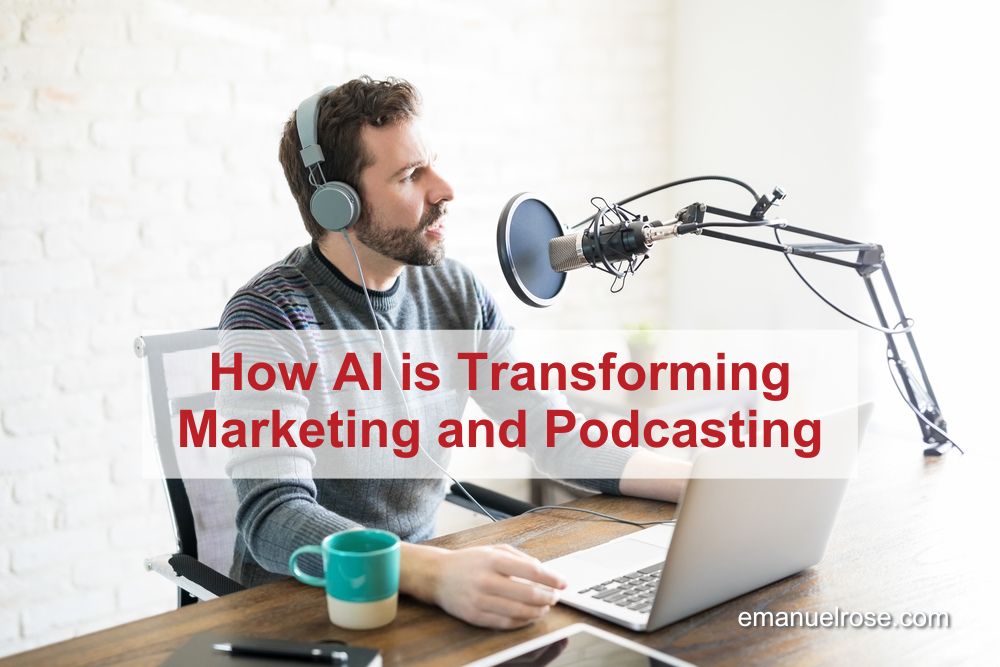The AI Revolution in Marketing
Over the last year, technology has significantly transformed marketing, with Artificial Intelligence (AI) playing a pivotal role. AI tools now allow us to engage in genuine, time-efficient marketing that wasn’t feasible even a year ago. This shift is particularly evident in the realm of podcasting, which has evolved from a labor-intensive task to a streamlined process enabling us to reach new markets and audiences.
The advent of AI has profoundly changed how marketers approach data. We now have access to a vast array of real-time data points, making it easier to understand and engage with our audience. However, this accessibility can be daunting. The sheer volume of data collected on every end user—somewhere between 37,000 data points—is staggering and can be overwhelming for individual privacy.
Enhancing Podcasting with AI
Insights from Pulse Podcasts, a company with over ten years of experience in the podcasting industry, reveal the laborious process involved in creating a podcast. It’s not just about finding a guest and recording a conversation; it involves extensive research, planning, editing, and promotion. To effectively reach a wide audience, a podcast must include well-researched content, coherent scripting, appealing graphics, and a meticulous marketing strategy.
Despite the complexity, podcasting remains a powerful marketing tool. Unlike other marketing strategies, podcasts offer a personalized connection with the audience. When individuals subscribe to a podcast, they are genuinely interested in the subject matter, leading to a more engaged and attentive audience. This is particularly advantageous for niche markets.
For instance, imagine you are targeting the insurance technology sector. While a standard website and social media presence are essential, they often rely on algorithms to reach the audience, and even paid promotions have limited visibility. In contrast, a podcast can directly reach and engage individuals interested in insurance technology, offering in-depth information and fostering a personal connection.

Producing a high-quality podcast can be time-consuming and resource-intensive. It involves scripting, recording, editing, writing descriptions, creating promotional materials, and ensuring regular output. This can easily consume six to eight hours per episode, a significant investment for small to mid-sized companies.
This is where AI comes into play. AI tools can drastically reduce the time and effort required for podcast production. They can handle various tasks, such as automating scriptwriting, voiceovers, and editing, making it feasible for smaller organizations to produce high-quality podcasts without extensive resources. This democratization of content creation enables companies to reach their target audience more effectively and at a lower cost.
Real-World Applications of AI in Podcasting
The integration of AI extends beyond production. For example, AI can convert newsletters into podcast scripts, voice them, and even handle editing and distribution. Organizations like local councils have successfully utilized AI to transform their newsletters into engaging podcasts. These AI-driven podcasts make it easier for residents to stay informed about community events and initiatives, significantly enhancing engagement and outreach.
AI also enables the repurposing of podcast content across various platforms. A single podcast episode can be transcribed, segmented into short clips, and shared on social media, providing a month’s worth of content from one recording session. This maximizes the reach and impact of the content, making it a highly efficient marketing strategy.
Crafting a Successful Podcast
The journey of creating a successful podcast begins with a well-structured content calendar. It’s essential to have a clear story arc that spans multiple episodes. This approach gives the series continuity and provides the audience with a compelling reason to follow along. Typically, the first few episodes set the scene, followed by episodes that explore industry challenges and conclude with future trends and developments.

For businesses considering starting a podcast, the first step is to define the overarching narrative and break it down into manageable episodes. For instance, a small insurance agency might start by discussing industry landscape, followed by historical context, current challenges, and future prospects. Each episode should feature experts or cover specific topics that align with the overall story arc.
Starting small and experimenting with different podcasting tools can also be beneficial. Obtain a basic recording setup, use free or low-cost editing software, license appropriate music, and watch tutorials to understand the process better. This hands-on experience will provide invaluable insights into the demands and rewards of podcasting.
The Rewarding Endeavor of Podcasting

Despite the initial challenges, many businesses find podcasting a rewarding endeavor. It offers an unparalleled opportunity to establish authority in a niche market, create a wealth of content, and foster genuine connections with the audience. Even small businesses can now produce professional-quality podcasts that were once beyond their reach.
Overall, AI has brought about a significant shift in marketing and podcasting, making it more accessible and efficient. By leveraging AI tools, businesses can streamline their content creation processes and ensure their message reaches the right audience effectively. As the podcasting industry grows, it presents an exciting avenue for marketers to explore and capitalize on.

